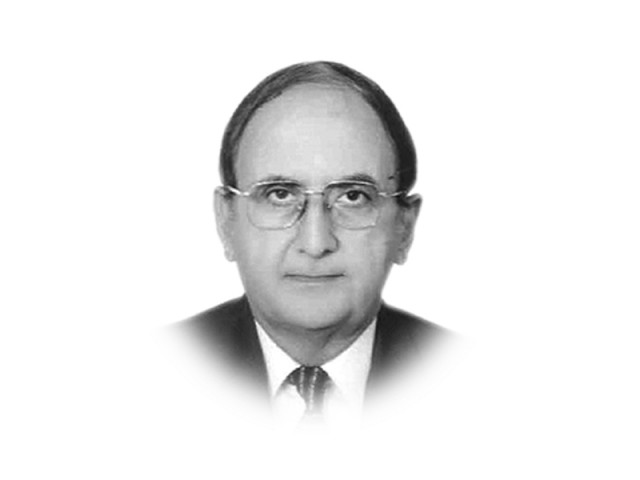The crisis of civilian supremacy
Latest interaction between civilian and military leadership on April 17 and 19 reflects their desire to work together.

The writer is an independent political and defence analyst. He is also the author of several books, monographs and articles on Pakistan and South Asian Affairs
Nawaz Sharif’s government has a comfortable majority in the National Assembly. It has secured external economic support that has created economic space for the next budget. However, these achievements do not necessarily guarantee that Nawaz will smoothly manage all issues of governance and political management.
If the strength of the military is organisation, discipline and control of the ‘gun’, the civilian government’s asset is popular support. This depends on providing basic services to the common citizen, easing economic pressure on them and ensuring personal security, including the rule of law and preservation of civil and political rights.
The civilian government should also recognise that it presides over a divided and fragmented political order. It can never be sure of full support for itself from all sections of the politically-active populace in a crisis situation. Even if some political party has agreed to support the government, such support cannot be taken for granted at all times. If circumstances change, the supporting party can change its stance.
The civilian government should use the available political support to improve governance and political management rather pulling punches on the military. Even if the PPP has recently agreed to support the current democratic order led by Nawaz, this does not mean that the PPP will continue to support the PML-N if it decides to take on the military. If civil-military relations deteriorate, several political and religious groups will build pressure on Nawaz, adopt a neutral position and watch the situation from the sidelines or support the change in federal government short of a military takeover.
If the government seeks the cooperation of the Pakistan Army for pursuing anti-polio vaccination drives, how can it pursue the peace talks with the Taliban all by itself through the interior minister? The government needs to take off its highly partisan and ideological blinders and pursue the Taliban issue in consultation with the army.
The Musharraf trial under Article 6 and three other cases will continue to haunt civil-military relations unless the government removes the widely shared impression that Musharraf is being targeted for personal reasons pertaining to Nawaz’s bitter experience of 1999-2000. There is a major dilemma here. If the Musharraf trial proceeds, the impression of personal grudge will persist. If other people are also taken to task for their role in aiding and abetting the violation of the constitution, so many people will be trapped that the government will find it difficult to handle.
The experience of several ex-military-ruled countries, especially Bangladesh, Indonesia, Chile and Turkey, shows that the prosecution of ex-military rulers for overthrowing a civilian government has a limited role in rehabilitation of civilian primacy. Only in Turkey, the coup makers of 1980 were put on trial in 2008 for overthrowing a civilian government. This was six years after the AK Party assumed power and won two general elections and one presidential election. In Bangladesh, Indonesia and Chile the military rulers were tried for other reasons, i.e., corruption, abuse of power, killings and human rights violations.
The key issue is not the trial of the coup-makers or public denunciation of the top brass, but how to make the military work within a liberal democratic constitutional framework that asserts civilian supremacy. This is a slow and cumbersome process requiring attitudinal changes on both sides: patience on the part of the military and performance on the part of the civilian leadership. The latter must not cause institutional insecurity for the military. It should strengthen itself in the political domain by working towards political continuity, accommodative politics between the ruling party and the opposition, good governance with reference to service delivery to people, economic growth and distributive justice and the management of cultural, religious, ethnic and regional discontinuities.
This does not mean that civilian primacy has to wait till all these goals are achieved. These goals may never be fully realised. However, the political civilian system must be viewed by the politically-active populace as making earnest efforts to achieve these goals. Most of them should feel that they are assured of a better future.
Civilian rule was facilitated in the above-mentioned four countries by the diminished security threats. Pakistan faces an extremely difficult internal security situation caused by religious extremism and terrorism. The Taliban and other radical groups challenge the legitimacy of the Pakistani state by an alternative ideology and through the use of violence. The external security pressures are also challenging. These threats increase the relevance of the military to the state’s survival and hinder the civilian efforts to command the political system.
The latest interaction between the civilian and military leadership on April 17 and 19 reflects their desire to work together. If this relationship has to go beyond professional and business-like interaction, reflecting mutual trust, the civilian leadership needs to give a dispassionate attention to the military’s concerns about the Musharraf issue and the talks with the Taliban.
Published in The Express Tribune, April 21st, 2014.
Like Opinion & Editorial on Facebook, follow @ETOpEd on Twitter to receive all updates on all our daily pieces.















COMMENTS
Comments are moderated and generally will be posted if they are on-topic and not abusive.
For more information, please see our Comments FAQ